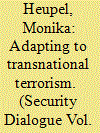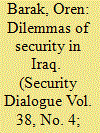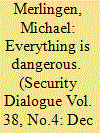|
|
|
Sort Order |
|
|
|
Items / Page
|
|
|
|
|
|
|
| Srl | Item |
| 1 |
ID:
080306


|
|
|
|
|
| Publication |
2007.
|
| Summary/Abstract |
During the 1990s, and particularly since 9/11, state-sponsored terrorism gradually declined, while transnational terrorism, which largely operates without direct state support and features cross-border network structures and a greater propensity to mass-casualty attacks, has gained in importance. Setting out from this observation, the purpose of this article is to examine whether the UN Security Council (SC) has adapted to transnational terrorism and, if so, how. Providing a systematic and theory-guided comparison of the SC's approach to these different types of terrorism, the article shows that, contrary to common considerations, the SC did adapt to transnational terrorism. The SC applied sanctions against terrorists and committed every state to instituting far-reaching generic counter-terrorism measures. Moreover, in an unprecedented way, it made use of managerial compliance strategies to foster implementation. In this way, the SC adapted to transnational terrorism by demanding more from states and intervening deeper into their domestic realm, while at the same time offering more support with respect to implementation. While such an approach is unlikely to become common SC practice in the short term, it is nevertheless symptomatic of a broader trend in the evolution of governance patterns in the post-national constellation today
|
|
|
|
|
|
|
|
|
|
|
|
|
|
|
|
| 2 |
ID:
080305


|
|
|
|
|
| Publication |
2007.
|
| Summary/Abstract |
This article suggests that much of the violence that has ravaged Iraq since the country's occupation by the US-led coalition in 2003 can be explained by focusing on the interplay between domestic and external factors that pushed Iraq's major communities (Shi'is, Sunnis, and Kurds) into conflict. The domestic factors include an intercommunal `security dilemma' that was engendered by the US-led invasion; the role of belligerent `ethnic entrepreneurs' within these communities; and the long-term animosities, apprehensions, and fears among their members. External factors include the disbandment of Iraq's ruling elite, regime, and security sector by the USA, along with the role of the Arab and Muslim volunteers who came to fight Iraq's foreign occupation. The article concludes by discussing the possible ramifications of the conflict in Iraq for domestic, regional, and international security, and mentions several steps that can help ameliorate it.
|
|
|
|
|
|
|
|
|
|
|
|
|
|
|
|
| 3 |
ID:
080304


|
|
|
|
|
| Publication |
2007.
|
| Summary/Abstract |
The article builds on the existing critique of `Normative Power Europe' (NPE), extending it in previously unexplored directions by drawing on the work of Michel Foucault. The author conceptualizes and empirically demonstrates the hidden face of European Union (EU) norm diffusion. The EU promotes human agency abroad through the promotion of fundamental civil, political and economic rights. This is the celebrated face of European foreign policy. Its other face - ignored by students of NPE (proponents and critics alike) - is that the EU's self-styled mission for humanity inscribes the very agency of those it seeks to empower in relations characterized by epistemic violence, the technologization of politics and administrative arbitrariness. The author delimits a conceptual space for investigating the two faces of NPE, making the case for a micropolitical analysis of EU norm diffusion. In two empirical snapshots, the article brings into focus the deep ambiguity of the EU's post-sovereign normative power.
|
|
|
|
|
|
|
|
|
|
|
|
|
|
|
|
| 4 |
ID:
080307


|
|
|
|
|
| Publication |
2007.
|
| Summary/Abstract |
This article analyses German preferences towards the EU Common Foreign and Security Policy (CFSP) and European Security and Defence Policy (ESDP). The lens of Europeanization, which traces both the top-down and the bottom-up influences between the European and the national levels, makes it possible to highlight the ways in which Germany was able to shape - and was shaped by - these two institutions. The analysis of decisions taken by the Schröder government in relation to the crisis in the former Yugoslav Republic of Macedonia (FYROM) and the war in Afghanistan in particular shows that, although moves towards the Europeanization of national foreign policy can be observed, transatlantic relations and national biases determined policy choices that involved the use of military force. The article concludes that although there is evidence of Europeanization of German foreign policy, the continuing influence of both NATO and domestic factors on policy outcomes means that conclusions regarding the Europeanization of national foreign policy can be easily overstated, particularly when it comes to the use of military force.
|
|
|
|
|
|
|
|
|
|
|
|
|
|
|
|
| 5 |
ID:
080303


|
|
|
|
|
| Publication |
2007.
|
| Summary/Abstract |
Knowledge and non-knowledge are equally constitutive for political decisionmaking. The relationship between what we know, what we do not know, what we cannot know and what we do not like to know determines the cognitive frame for political practice. This article analyses how uncertainty is perceived and how danger is constructed in the global `war on terror'. We fist identify threats, risks, catastrophes and ignorance as distinct kinds of danger. We then demonstrate how different notions of probability are used to determine their magnitude and to assign political responsibility. In the third part, we show how these `logics of danger' play out in current anti-terror strategies. Security policy in general and the `war on terror' in particular can only be explained, we argue, if ways of managing non-knowledge are taken into account
|
|
|
|
|
|
|
|
|
|
|
|
|
|
|
|
|
|
|
|
|